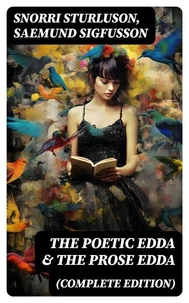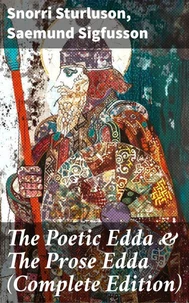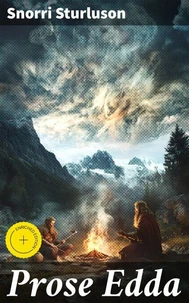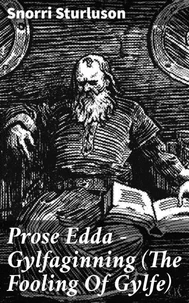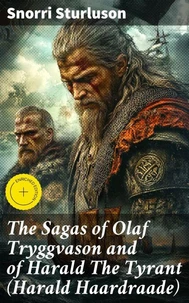Prose Edda
Par :Formats :
Disponible dans votre compte client Decitre ou Furet du Nord dès validation de votre commande. Le format ePub est :
- Compatible avec une lecture sur My Vivlio (smartphone, tablette, ordinateur)
- Compatible avec une lecture sur liseuses Vivlio
- Pour les liseuses autres que Vivlio, vous devez utiliser le logiciel Adobe Digital Edition. Non compatible avec la lecture sur les liseuses Kindle, Remarkable et Sony
 , qui est-ce ?
, qui est-ce ?Notre partenaire de plateforme de lecture numérique où vous retrouverez l'ensemble de vos ebooks gratuitement
Pour en savoir plus sur nos ebooks, consultez notre aide en ligne ici
- Nombre de pages72
- FormatePub
- ISBN859-65--4702183-4
- EAN8596547021834
- Date de parution29/05/2022
- Protection num.Digital Watermarking
- Taille378 Ko
- Infos supplémentairesepub
- ÉditeurDIGICAT
Résumé
The "Prose Edda, " composed by Snorri Sturluson in the early 13th century, serves as a fundamental text for understanding Norse mythology and poetics. This comprehensive work is not merely a collection of myths but a sophisticated framework explaining the nature of poetry and the cultural heritage of the Norse people. Sturluson's use of a colloquial yet erudite Icelandic vernacular enriches the narrative, incorporating elements of folklore, linguistic theory, and traditional storytelling.
The text is structured into three primary sections: the Gylfaginning, the Skáldskaparmál, and the Háttatal, each merging narrative and didactic elements to elucidate the significance of the mythic cosmos from creation to Ragnarok. Snorri Sturluson, an influential historian, poet, and politician, was deeply embedded in the cultural and intellectual milieu of medieval Iceland. His experiences as a chieftain and his scholarly pursuits likely fostered a keen interest in preserving Norse traditions during a time of rapid Christianization and cultural transformation.
Sturluson's motivations for compiling the "Prose Edda" may also reflect a desire to safeguard the legacy of Icelandic identity and literature amidst external pressures. This seminal work is indispensable for anyone intrigued by Norse mythology, literature, or medieval history. It not only offers profound insights into Viking culture but also serves as a crucial source for subsequent literary texts.
Scholars, students, and casual readers alike will find the "Prose Edda" an essential gateway into the rich tapestry of Norse heritage and its enduring impact on contemporary narratives.
The text is structured into three primary sections: the Gylfaginning, the Skáldskaparmál, and the Háttatal, each merging narrative and didactic elements to elucidate the significance of the mythic cosmos from creation to Ragnarok. Snorri Sturluson, an influential historian, poet, and politician, was deeply embedded in the cultural and intellectual milieu of medieval Iceland. His experiences as a chieftain and his scholarly pursuits likely fostered a keen interest in preserving Norse traditions during a time of rapid Christianization and cultural transformation.
Sturluson's motivations for compiling the "Prose Edda" may also reflect a desire to safeguard the legacy of Icelandic identity and literature amidst external pressures. This seminal work is indispensable for anyone intrigued by Norse mythology, literature, or medieval history. It not only offers profound insights into Viking culture but also serves as a crucial source for subsequent literary texts.
Scholars, students, and casual readers alike will find the "Prose Edda" an essential gateway into the rich tapestry of Norse heritage and its enduring impact on contemporary narratives.
The "Prose Edda, " composed by Snorri Sturluson in the early 13th century, serves as a fundamental text for understanding Norse mythology and poetics. This comprehensive work is not merely a collection of myths but a sophisticated framework explaining the nature of poetry and the cultural heritage of the Norse people. Sturluson's use of a colloquial yet erudite Icelandic vernacular enriches the narrative, incorporating elements of folklore, linguistic theory, and traditional storytelling.
The text is structured into three primary sections: the Gylfaginning, the Skáldskaparmál, and the Háttatal, each merging narrative and didactic elements to elucidate the significance of the mythic cosmos from creation to Ragnarok. Snorri Sturluson, an influential historian, poet, and politician, was deeply embedded in the cultural and intellectual milieu of medieval Iceland. His experiences as a chieftain and his scholarly pursuits likely fostered a keen interest in preserving Norse traditions during a time of rapid Christianization and cultural transformation.
Sturluson's motivations for compiling the "Prose Edda" may also reflect a desire to safeguard the legacy of Icelandic identity and literature amidst external pressures. This seminal work is indispensable for anyone intrigued by Norse mythology, literature, or medieval history. It not only offers profound insights into Viking culture but also serves as a crucial source for subsequent literary texts.
Scholars, students, and casual readers alike will find the "Prose Edda" an essential gateway into the rich tapestry of Norse heritage and its enduring impact on contemporary narratives.
The text is structured into three primary sections: the Gylfaginning, the Skáldskaparmál, and the Háttatal, each merging narrative and didactic elements to elucidate the significance of the mythic cosmos from creation to Ragnarok. Snorri Sturluson, an influential historian, poet, and politician, was deeply embedded in the cultural and intellectual milieu of medieval Iceland. His experiences as a chieftain and his scholarly pursuits likely fostered a keen interest in preserving Norse traditions during a time of rapid Christianization and cultural transformation.
Sturluson's motivations for compiling the "Prose Edda" may also reflect a desire to safeguard the legacy of Icelandic identity and literature amidst external pressures. This seminal work is indispensable for anyone intrigued by Norse mythology, literature, or medieval history. It not only offers profound insights into Viking culture but also serves as a crucial source for subsequent literary texts.
Scholars, students, and casual readers alike will find the "Prose Edda" an essential gateway into the rich tapestry of Norse heritage and its enduring impact on contemporary narratives.



